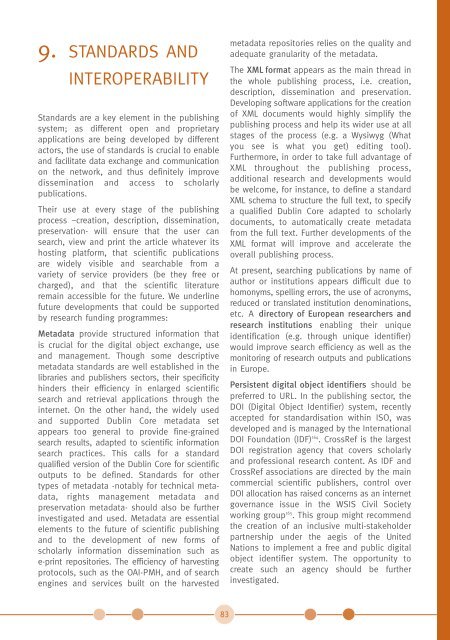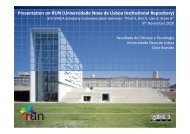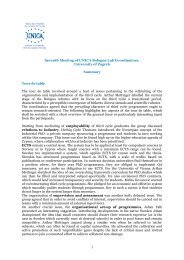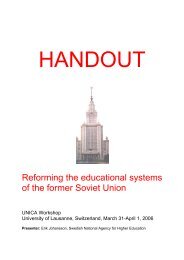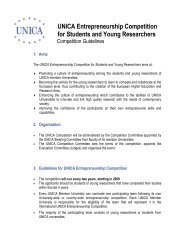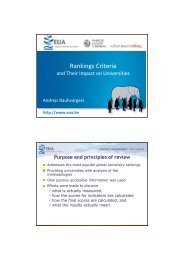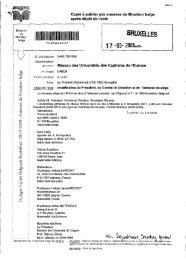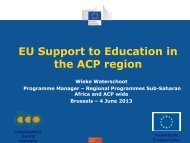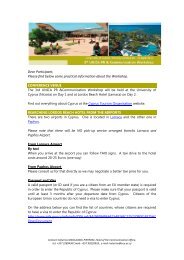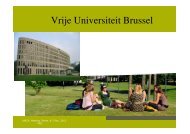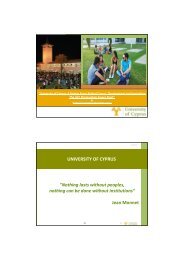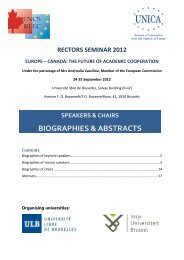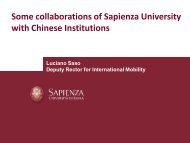Study on the economic and technical evolution of the scientific ...
Study on the economic and technical evolution of the scientific ...
Study on the economic and technical evolution of the scientific ...
Create successful ePaper yourself
Turn your PDF publications into a flip-book with our unique Google optimized e-Paper software.
9. STANDARDS AND<br />
INTEROPERABILITY<br />
St<strong>and</strong>ards are a key element in <strong>the</strong> publishing<br />
system; as different open <strong>and</strong> proprietary<br />
applicati<strong>on</strong>s are being developed by different<br />
actors, <strong>the</strong> use <strong>of</strong> st<strong>and</strong>ards is crucial to enable<br />
<strong>and</strong> facilitate data exchange <strong>and</strong> communicati<strong>on</strong><br />
<strong>on</strong> <strong>the</strong> network, <strong>and</strong> thus definitely improve<br />
disseminati<strong>on</strong> <strong>and</strong> access to scholarly<br />
publicati<strong>on</strong>s.<br />
Their use at every stage <strong>of</strong> <strong>the</strong> publishing<br />
process –creati<strong>on</strong>, descripti<strong>on</strong>, disseminati<strong>on</strong>,<br />
preservati<strong>on</strong>- will ensure that <strong>the</strong> user can<br />
search, view <strong>and</strong> print <strong>the</strong> article whatever its<br />
hosting platform, that <strong>scientific</strong> publicati<strong>on</strong>s<br />
are widely visible <strong>and</strong> searchable from a<br />
variety <strong>of</strong> service providers (be <strong>the</strong>y free or<br />
charged), <strong>and</strong> that <strong>the</strong> <strong>scientific</strong> literature<br />
remain accessible for <strong>the</strong> future. We underline<br />
future developments that could be supported<br />
by research funding programmes:<br />
Metadata provide structured informati<strong>on</strong> that<br />
is crucial for <strong>the</strong> digital object exchange, use<br />
<strong>and</strong> management. Though some descriptive<br />
metadata st<strong>and</strong>ards are well established in <strong>the</strong><br />
libraries <strong>and</strong> publishers sectors, <strong>the</strong>ir specificity<br />
hinders <strong>the</strong>ir efficiency in enlarged <strong>scientific</strong><br />
search <strong>and</strong> retrieval applicati<strong>on</strong>s through <strong>the</strong><br />
internet. On <strong>the</strong> o<strong>the</strong>r h<strong>and</strong>, <strong>the</strong> widely used<br />
<strong>and</strong> supported Dublin Core metadata set<br />
appears too general to provide fine-grained<br />
search results, adapted to <strong>scientific</strong> informati<strong>on</strong><br />
search practices. This calls for a st<strong>and</strong>ard<br />
qualified versi<strong>on</strong> <strong>of</strong> <strong>the</strong> Dublin Core for <strong>scientific</strong><br />
outputs to be defined. St<strong>and</strong>ards for o<strong>the</strong>r<br />
types <strong>of</strong> metadata -notably for <strong>technical</strong> metadata,<br />
rights management metadata <strong>and</strong><br />
preservati<strong>on</strong> metadata- should also be fur<strong>the</strong>r<br />
investigated <strong>and</strong> used. Metadata are essential<br />
elements to <strong>the</strong> future <strong>of</strong> <strong>scientific</strong> publishing<br />
<strong>and</strong> to <strong>the</strong> development <strong>of</strong> new forms <strong>of</strong><br />
scholarly informati<strong>on</strong> disseminati<strong>on</strong> such as<br />
e-print repositories. The efficiency <strong>of</strong> harvesting<br />
protocols, such as <strong>the</strong> OAI-PMH, <strong>and</strong> <strong>of</strong> search<br />
engines <strong>and</strong> services built <strong>on</strong> <strong>the</strong> harvested<br />
metadata repositories relies <strong>on</strong> <strong>the</strong> quality <strong>and</strong><br />
adequate granularity <strong>of</strong> <strong>the</strong> metadata.<br />
The XML format appears as <strong>the</strong> main thread in<br />
<strong>the</strong> whole publishing process, i.e. creati<strong>on</strong>,<br />
descripti<strong>on</strong>, disseminati<strong>on</strong> <strong>and</strong> preservati<strong>on</strong>.<br />
Developing s<strong>of</strong>tware applicati<strong>on</strong>s for <strong>the</strong> creati<strong>on</strong><br />
<strong>of</strong> XML documents would highly simplify <strong>the</strong><br />
publishing process <strong>and</strong> help its wider use at all<br />
stages <strong>of</strong> <strong>the</strong> process (e.g. a Wysiwyg (What<br />
you see is what you get) editing tool).<br />
Fur<strong>the</strong>rmore, in order to take full advantage <strong>of</strong><br />
XML throughout <strong>the</strong> publishing process,<br />
additi<strong>on</strong>al research <strong>and</strong> developments would<br />
be welcome, for instance, to define a st<strong>and</strong>ard<br />
XML schema to structure <strong>the</strong> full text, to specify<br />
a qualified Dublin Core adapted to scholarly<br />
documents, to automatically create metadata<br />
from <strong>the</strong> full text. Fur<strong>the</strong>r developments <strong>of</strong> <strong>the</strong><br />
XML format will improve <strong>and</strong> accelerate <strong>the</strong><br />
overall publishing process.<br />
At present, searching publicati<strong>on</strong>s by name <strong>of</strong><br />
author or instituti<strong>on</strong>s appears difficult due to<br />
hom<strong>on</strong>yms, spelling errors, <strong>the</strong> use <strong>of</strong> acr<strong>on</strong>yms,<br />
reduced or translated instituti<strong>on</strong> denominati<strong>on</strong>s,<br />
etc. A directory <strong>of</strong> European researchers <strong>and</strong><br />
research instituti<strong>on</strong>s enabling <strong>the</strong>ir unique<br />
identificati<strong>on</strong> (e.g. through unique identifier)<br />
would improve search efficiency as well as <strong>the</strong><br />
m<strong>on</strong>itoring <strong>of</strong> research outputs <strong>and</strong> publicati<strong>on</strong>s<br />
in Europe.<br />
Persistent digital object identifiers should be<br />
preferred to URL. In <strong>the</strong> publishing sector, <strong>the</strong><br />
DOI (Digital Object Identifier) system, recently<br />
accepted for st<strong>and</strong>ardisati<strong>on</strong> within ISO, was<br />
developed <strong>and</strong> is managed by <strong>the</strong> Internati<strong>on</strong>al<br />
DOI Foundati<strong>on</strong> (IDF) 164 . CrossRef is <strong>the</strong> largest<br />
DOI registrati<strong>on</strong> agency that covers scholarly<br />
<strong>and</strong> pr<strong>of</strong>essi<strong>on</strong>al research c<strong>on</strong>tent. As IDF <strong>and</strong><br />
CrossRef associati<strong>on</strong>s are directed by <strong>the</strong> main<br />
commercial <strong>scientific</strong> publishers, c<strong>on</strong>trol over<br />
DOI allocati<strong>on</strong> has raised c<strong>on</strong>cerns as an internet<br />
governance issue in <strong>the</strong> WSIS Civil Society<br />
working group 165 . This group might recommend<br />
<strong>the</strong> creati<strong>on</strong> <strong>of</strong> an inclusive multi-stakeholder<br />
partnership under <strong>the</strong> aegis <strong>of</strong> <strong>the</strong> United<br />
Nati<strong>on</strong>s to implement a free <strong>and</strong> public digital<br />
object identifier system. The opportunity to<br />
create such an agency should be fur<strong>the</strong>r<br />
investigated.<br />
83


